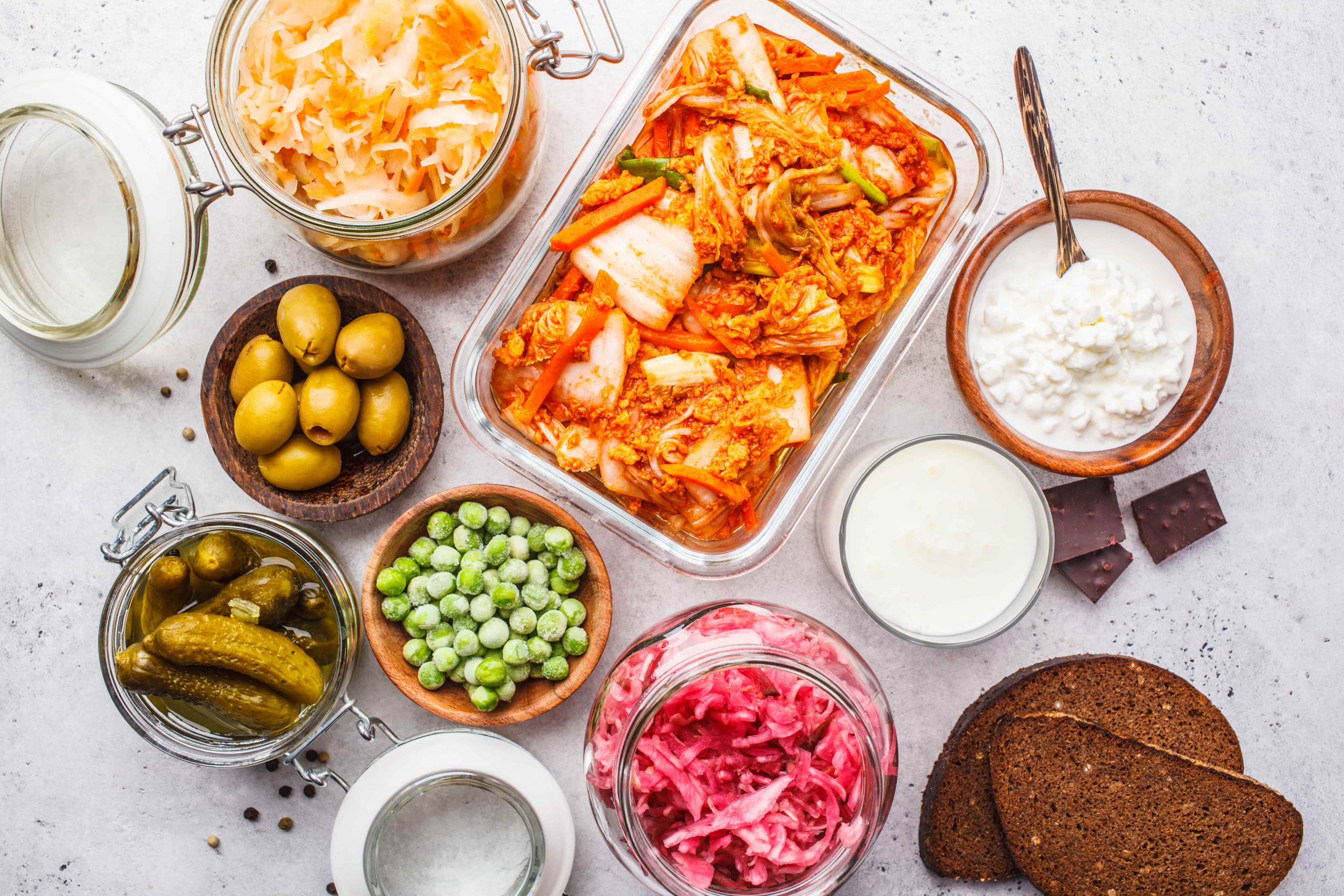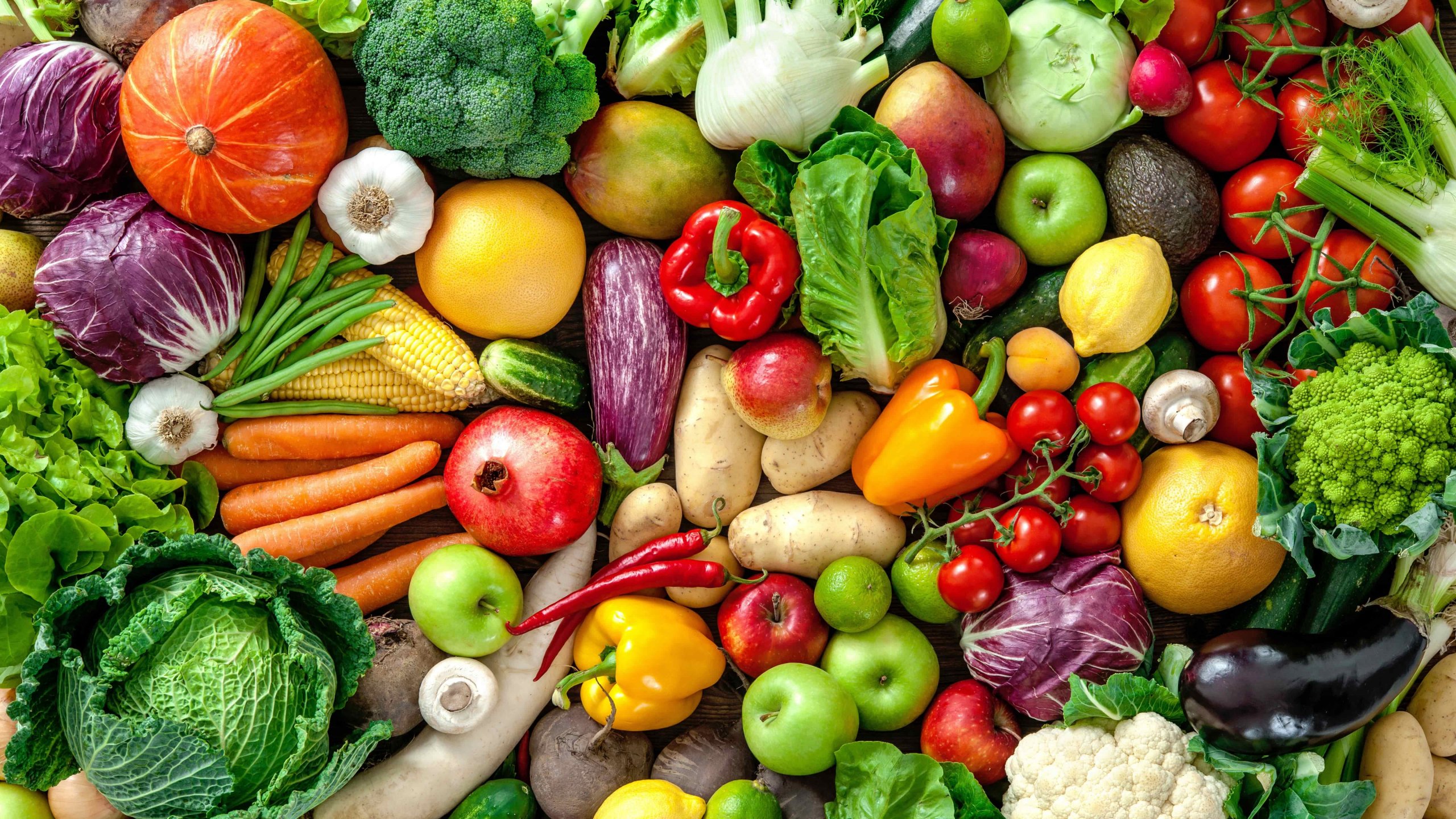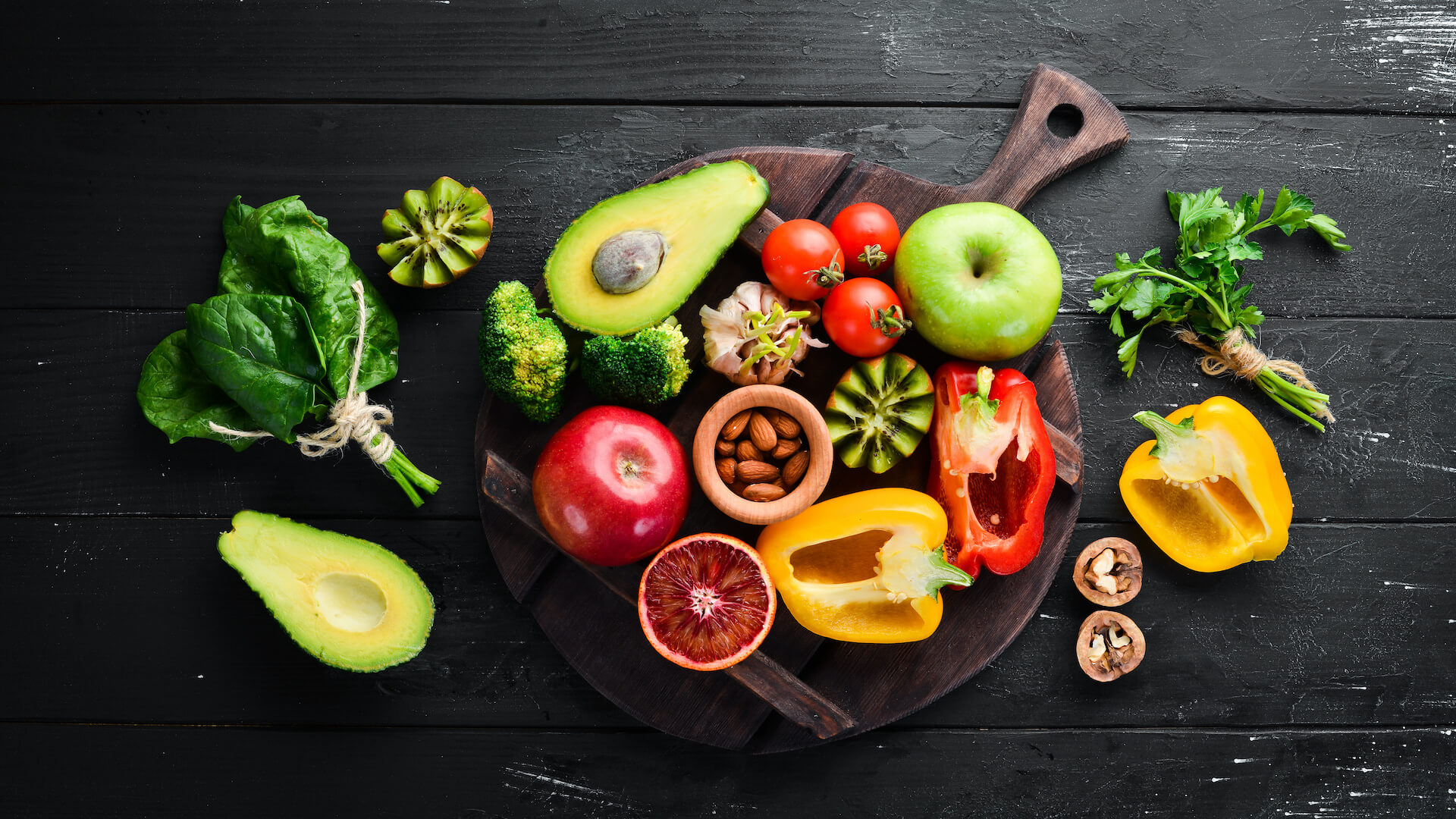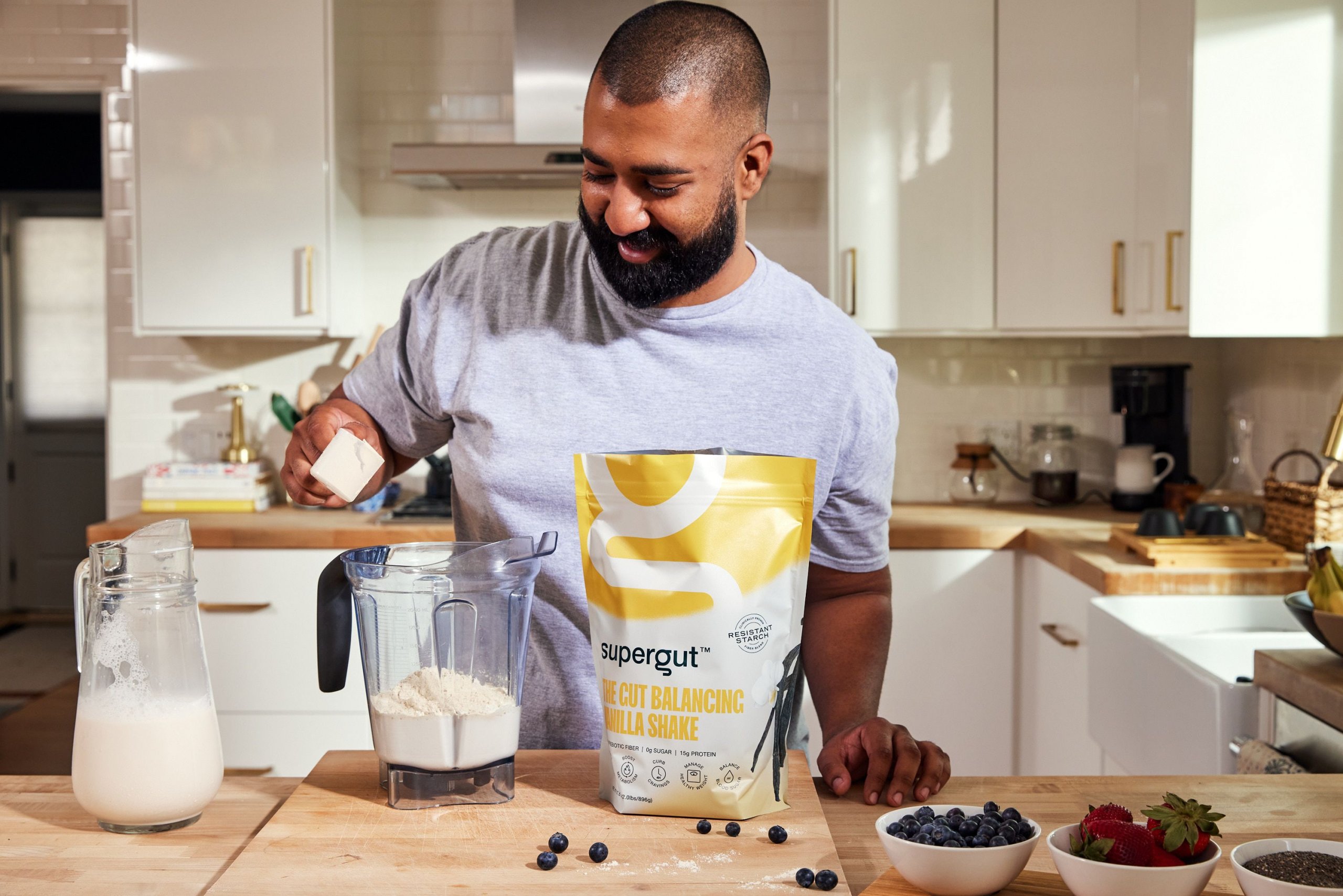If you’re wondering how to improve gut health, then you’ve come to the right place.
The key to optimal gut health is actually pretty simple: eat mostly plants, opt for the Four Phonetic F’s of food (Ferments, Phenols, Fats, and Fibers like resistant starch), stay active and well-rested, get outdoors, and avoid stress. Simple, right??
Use this guide as a starting point for simple but effective (and research-based!) actions you can take to improve your gut health starting today.
1. Opt for Fermented Foods

Fermentation is an ancient food preservation process where sugars are broken down by bacteria and yeasts. Fermented foods are great for gut health because they’re packed with probiotics and are an excellent source of postbiotics, the byproducts they produce, which enhance microbial diversity and decrease inflammation. [1, 2]
The key is to incorporate a wide range of fermented foods in order to maximize the variety of microbes. Different sugars and fibers and other nutrients attract different strains of bacteria after all, and the goal is to have lots of different “bugs” in your microbiome.
Some great fermented foods to add to your diet include: sauerkraut, kimchi, olives, yogurt, kefir, tempeh, cottage cheese, and pickles.
2. Eat the Rainbow

When people say, “Eat the Rainbow,” they’re basically saying, “Diversity of Plants.” It’s shorthand for making sure you’re getting enough phytonutrients like polyphenols in your diet.
Polyphenols are the compounds that give fruits and vegetables their colors. Each polyphenol is different in how it interacts with and benefits your gut. And there are at least 8,000 different polyphenols identified in nature whose main functions are as prebiotic gut balancers and health-promoting antioxidants. [3]
For a happier gut, opt for lots of vibrantly colored fruits and vegetables: orange carrots, red tomatoes, purple cabbage, green broccoli, blueberries, blackberries, red berries, and more!
3. Get More Omega-3s

In our current westernized diets — because of the way many of the foods we eat are processed — we have an imbalance of fatty acids. We get too many Omega-6 fats and not enough Omega-3s. Maintaining something closer to a 1-to-1 balance is optimal for gut health.
Not to mention, Omega-3s are great for our guts because they increase anti-inflammatory compounds like short-chain fatty acids. They can also boost immunity, strengthen intestinal walls, and influence the gut-brain axis. [4]
Foods high in Omega-3s include: fatty fish (like salmon, sardines, tuna, mackerel), fatty fruits and their oils (avocado and olive), tree nuts and their butters (almond, cashew, dark chocolate).
4. Strive for High Fiber Foods

When people think about fiber, they often just think fruits and vegetables (which is good, and we could always use more!). However, the plant fibers a lot of people actually don’t get enough of are in the realm of whole grains, seeds, nuts, and legumes.
The gut health benefits of fiber are huge. Studies show fiber can support weight loss, heart health, blood sugar regulation, digestive health, and even longer lifespans! [5] As ever, diversity of fiber intake is key in order to maximize nutrients. Legumes are good sources of fiber, protein, and complex carbs. Nuts and seeds offer fiber, good fat, and protein. Whole grains provide fiber and complex carbs. Fruits and vegetables are good sources of fiber, phytonutrients, and complex carbs.
To get more fiber in your diet, eat steel cut oats, beans, brown rice, whole grain breads and pastas, fruits, and veggies. Your gut will thank you!
5. Incorporate Food Supplements with Added Fiber and Resistant Starch

If you aren’t getting enough fiber in your diet — and chances are you aren’t since only 5% of Americans consume enough dietary fiber [6] — the next best thing is to fill in the gaps with supplements.
There are LOTS of different types of fiber supplements out there. But 3 forms with unique gut-healing benefits include: Arabinoxylan (found in psyllium husks and used in big brand fiber supplements), Beta-Glucan (found in oats and barley and shown to improve insulin sensitivity and blood sugar levels [7]), and resistant starch (a powerful prebiotic fiber that resists digestion in your small intestine and feeds the good bacteria in your gut).
At Supergut, we’ve done a ton of research on the benefits of different dietary fibers and have specially formulated a blend (with a diversity of resistant starch!) to have the greatest gut balancing bang. Our formula sources a low FODMAP mix of unripened green bananas, resistant potato starch, and oat beta-glucan.
6. Get Quality Sleep

The Gut-Brain Axis is like a two-way highway system of signals within your body. When your gut is imbalanced, your brain health can suffer (with things like brain fog and mood imbalance). In turn, when your brain health is compromised, your gut health can suffer.
It’s important to harness this feedback loop by eating well so that you can sleep well, and sleeping well, so that your gut can take time to heal. Getting quality sleep can lower your cortisol levels, which can prevent inflammation and leaky gut. [8] Aim for 7-8 hours of sleep per night to keep your gut-brain axis firing on all cylinders!
In our own double-blind clinical trial, we saw early signals of sleep-improvement by consuming resistant starch like the blend we use in Supergut products.
7. Practice Mindfulness & Meditation

Mindfulness-Based Stress Reduction (MBSR) is a form of meditation therapy that’s increasingly shown some pretty hard-evidenced outcomes in the realm of stress management and anxiety/depression treatment in recent years. [9] Less stress = less toll on your mind, body, and microbiome.
Give your mind (and gut) a literal breather by incorporating 10-20 minutes of breathwork meditation into your day once or twice daily.
8. Move Every Day

The two pillars of health most people tend to intuitively recognize are: 1) Eating well and 2) Exercising. Exercise has TONS of health benefits, including longer healthspan and delaying the onset of more than 40 chronic conditions/diseases. [10]
In terms of boosting gut health specifically, some studies suggest that exercise can enhance the number of beneficial microbial species, enrich the microflora diversity, and improve the development of commensal bacteria. [11] AKA, when you get moving, the little bugs in your gut get moving, too!
As a general rule, aim for at least 30 minutes of moderate physical activity every day. Reducing sitting time is important, too. The more hours you sit each day, the higher your risk of metabolic problems.
9. Do Some Gardening

There are a few aspects of gardening that are really cool from a gut health perspective! For one, all the soil microbes you’re exposed to can influence the microbial composition of your intestines. [12] Gardening is also a form of exercise. And it’s a way to get more Vitamin D exposure, which can exert immune-boosting effects against inflammatory bowel diseases. [13]
Finally, if you’re gardening your own fruits and veggies, it’s more than likely these will be organically grown, which will have more nutrients than store-bought foods. [14]
So, go ahead! Get out there and get your hands dirty, your Vitamin D flowing, and your gut microbiome exposed to bugs!
10. Raise Your Children with Pets

Turns out man’s best friend is also a microbe’s best friend! Studies show that children exposed to furry pets early on in their development typically have lower rates of allergies and stronger gut microbiomes. [15] The logic is that environments that are too sterile mean the immune system isn’t challenged properly, so can’t perform optimally when it eventually is.
Pets come fully loaded with the darndest array of dirt, dander, bugs, bacteria, the works. They roll in mud, eat things they shouldn’t, and sniff things you wouldn’t touch with a ten-foot pole… until they cuddle up next to you on the couch, that is! And this kind of exposure is great for improving our immune systems (70-80% of which live in your gut microbiome by the way!). [16]
So, by all means let your pet in the bed!
Learn more about gut health and get clinically-validated solutions to improve your gut and more at Supergut.com. For a downloadable version of this guide, check out 10 Things You Can Do to Improve Your Gut Health Today.








